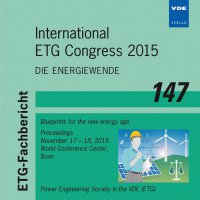Parameterization of Reactive Power Characteristics for Distributed Generators: Field Experience and Recommendations
Conference: International ETG Congress 2015 - Die Energiewende - Blueprints for the new energy age
11/17/2015 - 11/18/2015 at Bonn, Germany
Proceedings: International ETG Congress 2015
Pages: 8Language: englishTyp: PDF
Personal VDE Members are entitled to a 10% discount on this title
Authors:
Kraiczy, M.; Stetz, T.; Arnold, G.; Braun, M. (Fraunhofer IWES, Königstor 59, 34119 Kassel, Germany)
Lammert, G.; Gehler, S.; Braun, M. (University of Kassel, Kassel, Germany)
Schmidt, S. (Bayernwerk AG, Regensburg, Germany)
Homeyer, H. (Avacon AG, Salzgitter, Germany)
Zickler, U.; Sommerwerk, F. (TEN Thüringer Energienetze GmbH, Erfurt, Germany)
Elbs, C. (Vorarlberger Energienetze GmbH, Bregenz, Austria)
Abstract:
This paper presents recommendations for an effective commissioning and operation of distributed generators (DGs), focussing on the aspect of reactive power control for static voltage support. Error-sensitive tasks in the process chain from commissioning to operation are revealed, based on first-hand field experience of major German and Austrian distribution grid operators. The evaluation shows that the share of DGs, which currently cannot be operated in compliance with the requirements of relevant grid codes and guidelines, is noticeable. The issues and challenges related to grid code compliant DG operation are multilateral. For example the parameterization of reactive power controllers turned out to be an error-sensitive task, due to the diversity of manufacturer-specific GUIs and the lack of clear parameter definitions. Different, typical DG parameterization errors are categorized and measurement examples from the field are presented. Furthermore, the impact of non-grid code compliant parameterizations of DGs on the distribution grid operation is discussed. As a consequence, the authors recommend founding a European, industry-driven working group for defining binding parameter definitions and further commissioning standards.


